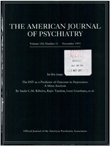Salivary cortisol levels and their correlation with plasma ACTH levels in depressed patients before and after the DST
Abstract
OBJECTIVE: The aim of this work was to study the clinical utility of salivary cortisol concentrations in a group of depressed patients undergoing the dexamethasone suppression test (DST) and the correlation of these concentrations with plasma ACTH levels. METHOD: Twenty outpatients from the psychiatric department of a Barcelona hospital who were diagnosed as having nonendogenous (N = 9) or endogenous (N = 11) depression according to DSM-III criteria and the Newcastle scale participated in the study. The comparison group consisted of 12 healthy volunteers. Blood and saliva samples were taken before and after administration of 1 mg of dexamethasone Salivary cortisol and plasma ACTH concentrations were determined by direct iodine-125 radioimmunoassay with commercial kit reagents. RESULTS: Predexamethasone salivary cortisol concentrations were significantly higher in the group with endogenous depression than in the comparison group. A significant correlation was obtained between plasma ACTH and predexamethasone salivary cortisol levels in the group with nonendogenous depression and in the comparison subjects. CONCLUSIONS: These preliminary findings indicate that salivary cortisol could substitute for plasma cortisol in clinical studies in which the DST and hypercortisolemia are evaluated. The lack of correlation between ACTH and cortisol levels in saliva in the group of endogenously depressed patients could indicate a disturbance in the regulation of cortisol secretion in major depression.
Access content
To read the fulltext, please use one of the options below to sign in or purchase access.- Personal login
- Institutional Login
- Sign in via OpenAthens
- Register for access
-
Please login/register if you wish to pair your device and check access availability.
Not a subscriber?
PsychiatryOnline subscription options offer access to the DSM-5 library, books, journals, CME, and patient resources. This all-in-one virtual library provides psychiatrists and mental health professionals with key resources for diagnosis, treatment, research, and professional development.
Need more help? PsychiatryOnline Customer Service may be reached by emailing [email protected] or by calling 800-368-5777 (in the U.S.) or 703-907-7322 (outside the U.S.).



